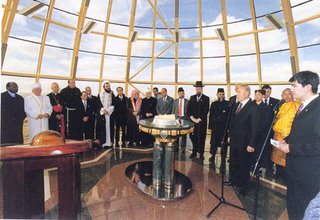Kazakhstan: Taking Leadership in Interfaith Relations
I am in Kazakhsatan this week attending a meeting of the Secretariat for the Congress of World and Traditional Religions. The following is a blurb about Kazakh culture, religion and their congresses, including a picture from the 2003 congress. I'll give you my reflections tomorrow.
Kazakhstan is at the crossroads of Asia and Europe and Islamic, Christian and Buddhist cultures. The territory of Kazakhstan has been the meeting place of different religions and civilizations for centuries. The population is made up of representatives of more than 130 ethnic groups and 46 religious denominations.
Kazakhstan is a secular state where religion is separated from the state. Yet the country has created conditions for spiritual revival and has guaranteed constitutional freedoms of worship and religion.
In September 2003, the initiative of the President of Kazakhstan Nursultan Nazarbayev to convene in Astana a Congress of Leaders of World and Traditional Religions has become Kazakhstan’s tangible contribution to interfaith and intercultural understanding, harmony and cooperation as a mechanism to maintain regional and global stability.
The first Congress adopted a Declaration proclaiming that its participants were prepared to make every effort not to allow the use of religious differences as an instrument of hatred and discord, in order to save mankind from a global conflict of religions and cultures. The Declaration of the Congress was circulated as an official document of the fifty-eight session of the UN General Assembly.
The Second Congress of Leaders of World and Traditional Religions will take place in Astana in September 2006. The Congress secretariat has approved its concept and theme, which is "Religion, Society and International Security”.
Work is under way to institutionalize the Congress of Leaders of World and Traditional Religions. The objective is for the Congress to function as a permanent international organization, which implements decisions taken by influential spiritual leaders.
The city of Astana has launched a major construction project - a Palace of Peace and Accord. That structure will house the headquarters of the Congress of Leaders of World and Traditional Religions, an Institute of Civilizations and a large theological library for global religious studies.
The establishment of the Assembly of the Peoples of Kazakhstan under initiative of President Nazarbayev 10 years ago represents a unique experience of maintaining interethnic accord and intercultural dialogue in Kazakhstan. That institution not only contributes to interethnic unity and accord but also promotes tolerance and interfaith dialogue. Democratic legislative norms and acts regarding interethnic relations, a balanced language policy, the functioning of ethnic cultural centers and commemoration of days of cultures of the peoples living in Kazakhstan, contribute to dialogue and interaction between different ethnic groups and nationalities and cultures of multiethnic and multiconfessional Kazakhstan.
The international reputation of that body is rather strong and recognized by many countries and international organizations. On visiting Kazakhstan in 2002, Secretary-General Kofi Annan called it “a model of interethnic accord and a stable and sustainable development for other states”.


0 Comments:
Post a Comment
<< Home